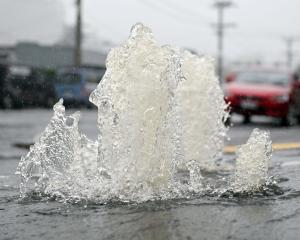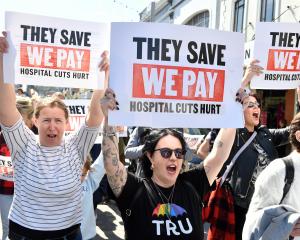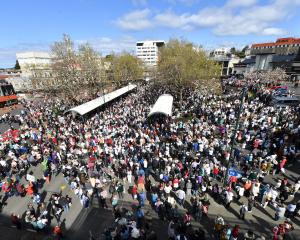
And so I was pleased when the Dunedin City Council passed a motion that focused on supporting the rebuild and ensuring no compromise to clinical services.
Many at the council table continue to argue for the quality health services we expect and deserve in the South.
When it opens, this hospital needs to be the best in the country with more modern fit-for-purpose facilities than anywhere comparable around the country.
It will certainly be the most expensive hospital ever built in New Zealand.
At 90,000sq m it will be considerably bigger than our current hospital, which is 70,000sq m. When finished, it will have 410 beds, which is more than the 367 in the current hospital. And so on.
Unfortunately, some involved in the recent DCC campaign have fancied themselves as hospital architects, misunderstanding the costs of redesign and arguing we should return to a more expensive and less efficient plan developed two years ago.
To my mind that should not be the focus of our local debate. What should be front and centre for us all is health outcomes.
This is not a vanity project, it is a hospital and we want people to get well there.
And so when the mayor recently chose to leak details of a private letter to him from local Labour MPs expressing "bemusement" at some of his priorities, I was a little disheartened.
I believe we need to focus squarely on health outcomes for Dunedin residents and avoid the red-herring of a return to a more expensive, less efficient hospital design that is several iterations old.
The public deserves the best hospital. Not an out-of-date draft hospital. The well-being of our citizens is at stake.
For anyone interested in reading the local Labour MPs’ letter to the mayor in context — it can be viewed below.
Letter to Mayor Jules Radich
Dear Jules,
RE: New Dunedin Hospital
Thank you for your letter of 1/3/23. We are replying as one.
You have sought our ‘commitment to delivering the full suite of services as promised in the Detailed Business Case’. We happily make that commitment. We know with certainty that the full suite of services will be delivered as promised. The savings announced in December save the taxpayer money but do not reduce services, at all.
We think it is how a responsible government should act; allow us to explain why.
There were two broad ways in which the savings were made. Easily the larger chunk of the money was saved by making the hospital design more efficient, and by shifting some functions off site. This includes making better use of the bottom part of the light well, removing the triangular shaped pavilion, making savings in façade design, making some savings in engineering plant, requiring the private sector pathology provider to undertake more of their analysis offsite, and by utilising the adjacent and historic dairy building, which will be conserved in the process.
We are not sure why you might oppose any of those changes. We think they are sensible.
The second, much smaller, chunk of the money was saved by deferring expenditure on some clinical facilities, because there may well not be a need for those facilities on opening day. This is normal practice in hospital construction; it allows for an increase in future capacity just by fitting out shelled spaces. The detailed business case already allows for 10 of 40 specialist ICU beds to be shelled, along with some of the additional surgical theatres. The savings announced in December shelled 12 more beds (of 410), and one (of three) MRI scans. This does not result in the reduction of any services. It merely delays the provision of extra capacity until that capacity is needed. Admittedly the savings are small, but that means the cost of ‘turning on’ that capacity is also small.
Again, we do not see why you might oppose this more efficient use of capital expenditure.
In addition, the single PET scan will be shelled. The private sector will be providing PET scanning in Dunedin before the new hospital opens in 2028. Therefore, the second PET scanner won’t be needed until sometime after opening day.
That leaves the only real ‘cut’ in the whole package – the permanent reduction of acute, elective and day surgery theatres from 20 to 18. Yet even this creates absolutely no reduction in service, because the trend these days is towards a 10-hour surgical day rather than an 8-hour day. It means we make more efficient use of expensive equipment, something we feel sure you would endorse. We hope that also means that some surgical staff might enjoy a 4-day week not a 5-day week. For comparison the current hospital has 12 theatres.
In summary, we are a bit bemused by your opposition. We don’t get it. It is true that redesigning the hospital costs time and money. But those costs are known and the savings still deliver good value to the taxpayer. It is also true that we may well face future design challenges and cost increases. But that is no reason to oppose good quality savings now.
We understand, and share, the sadness of losing the pavilion as an architectural feature, especially the loss of the korowai on the façade. However, we understand that Aukaha have been re-engaged to help design a suitable substitute.
Confusingly, there were earlier plans by officials last year to make deeper cuts that would indeed have affected clinical services. These plans were not progressed, and as local MPs we are of one mind that they must never be.
We think there are other things that you, and we, should be a lot more concerned about. We are anxious to know that the accompanying IT capacity will be up to scratch; we are not yet sure that the necessary training and recruitment of the various health professionals is adequate, and we are very keen that the interprofessional learning centre is approved and funded by our University, Polytech and the health system. We urge you to direct your attention to these areas.
Lastly, we wish to acknowledge the remarkable assistance and support that the DCC has provided in the past 5 years. There has always been free dialogue, an honest exchange of views, consistent professionalism and responsiveness during the consenting processes, and plenty of respect.
As members of the Government that finally got this well overdue project underway we would like to offer the DCC our heartfelt thanks.
Yours sincerely,














